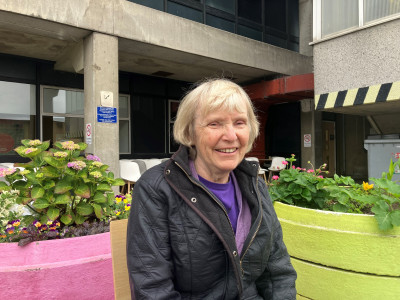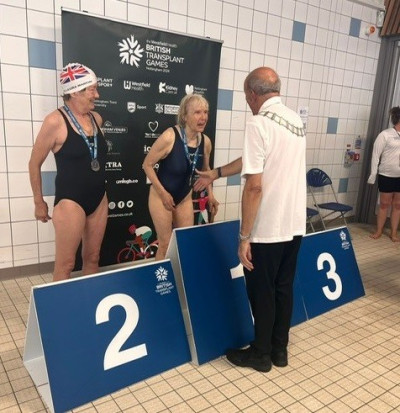
Retired lawyer Hilary Gerlis, 76, came first in the over 70s freestyle 100m and 50m backstroke races at the games held in Nottingham earlier this month.
Following her kidney transplant in 2022, Hillary, from Wiltshire, started suffering from repeated and frequent urinary tract infections (UTIs). As a result, she was unable to do any exercise and lost 10kg.
As part of a study run by kidney consultant Professor Alan Salama, Hilary took the vaccine Uromune, last April and it helped turn her life around.
“I noticed the difference within a few weeks,” she said. “I thought, ‘I haven’t had an infection all month’. I started putting on weight and I am back riding my horse and swimming which meant I could compete in the transplant games.”

Persistent infections can lead to a loss of transplant function and may sometimes cause their new organ to fail.
In addition, because the treatment for urine and kidney infections is antibiotics, frequent use increases the chance of antibiotic-resistant bugs emerging.
But data from Professor Salama’s study has revealed that the number of infections could be cut dramatically thanks to the use of the vaccine.
It protects against the four most common bugs, which cause 95% of urine infection. As part of Professor Salama’s quality improvement project, a total of 21 people were given the vaccine, with 17 showing significant improvements in the number of infections.
Before having the vaccine, this cohort of patients had spent 78 days in hospital due to urine infections. Following the vaccine, there were just four days spent in hospital – the vast majority had not needed to come in at all.
Professor Salama said: “This vaccine has been available for a while, but one question we didn’t know was how well it would work in transplant patients who are taking immune-suppressing medication.
“But we’re really pleased that it has shown a dramatic improvement for this small number of patients who have received it.
“This vaccine is potentially hugely beneficial to patients as it will mean less time in hospital for them, and less time spent being unwell with an infection. It also has benefits in terms of reducing antibiotic resistance and in savings to the NHS as it will mean fewer patients needing hospital admissions.”
Professor Salama estimated that it could save the trust £32,000 per year, because of the reduction in hospital admissions. It will also mean beds becoming available for other patients who need to be in hospital.
He said the next step would be a larger study, involving patients from trusts across the country.
Hilary, who has a genetic condition called hereditary angiopathy with nephropathy, aneurysms and muscle cramps syndrome which damaged her kidneys over time, is now also planning a series of trips abroad, which wouldn’t have been possible without the vaccine.
She said: “This year I have been to Vienna, to Australia and to Denmark and in a few months’ time I’m going to Greenland – I was not well enough to do that before I had the vaccine.
“I would recommend it to other kidney transplant patients. Without doubt it’s made a huge difference to my life.”
Images: Top, Hilary at the Royal Free Hospital and, bottom, Hilary being congratulated after her victory in the pool.
 Translate
Translate